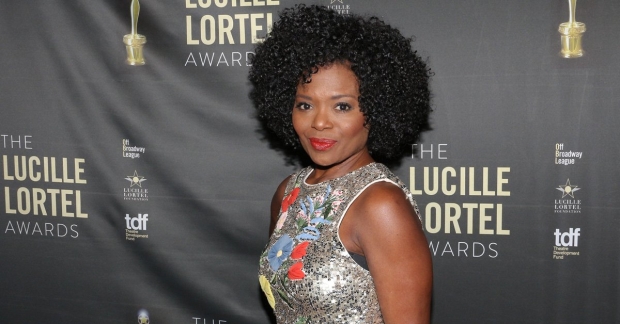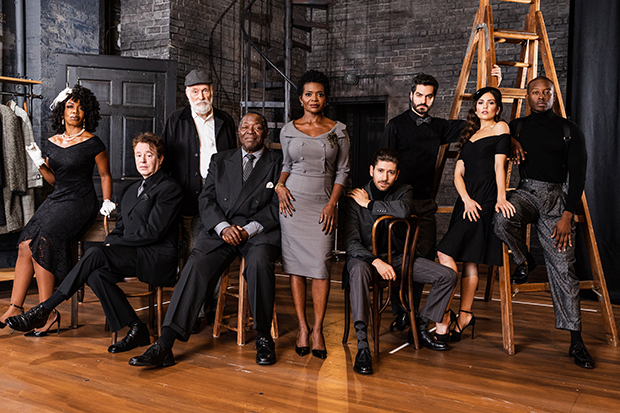Interview: LaChanze Leads Trouble in Mind to Broadway — 66 Years After Its Premiere
The Tony winner returns to Broadway in this new production of Alice Childress’s storied drama.
To reopen the American Airlines Theatre, Roundabout Theatre Company is presenting the Broadway debut of a 66-year-old play: Alice Childress's Trouble in Mind. The drama is an exploration of racism, feminism, and identity, all set backstage at a theater during rehearsals for a new Broadway production. The work itself has a unique history: first presented off-Broadway in 1955, a Broadway transfer was subsequently planned, though eventually scuttled because Childress refused to change her ending.
After decades relegated to regional productions and the history books, the drama is onstage on 42nd Street, directed by Charles Randolph-Wright and starring the estimable Tony winner LaChanze as the central character, Wiletta Mayer. It's a chance for LaChanze to get to take on a rare nonmusical role, and one that couldn't be timelier as we come back from the twin pandemics of Covid and global racial unrest.

(© David Gordon)
This conversation has been condensed and edited for clarity.
Trouble in Mind is a play that feels like it could have been written yesterday, and yet it's almost 70 years old. Still, it's not particularly well known outside the theater community, even though its prescience is pretty jaw-dropping.
That's what's been so powerful about this. It's this treasure that…Was not hidden, but kind of ignored, basically. I studied it in college. I went to an HBCU, so I knew all about Alice Childress and her work, and the work of so many other Black playwrights that haven't had their day in the commercial theater sun, if you will. But yeah, it's a piece that is just bold, and Alice was such a courageous writer. Even with Wedding Band and her other plays, she was unafraid to speak truth to power. And I think that's something that producers maybe don't want. They want entertainment. But I was so willing to just say, you know what, I'm not rewriting the ending to make you happy, even if it's just detrimental to the future of my career and the history of the play.
When you think about it, that's a pretty powerful thing for a playwright in the 1950s, and not just a playwright, but a Black, female playwright, to say and do.
Exactly. It just shows you the kind of woman she was, and her love for the truth of storytelling. In my personal research, one thing that was consistent in all of her interviews, or writings, or articles that I read about her, was that she felt that she needed to champion the underdog. To have given a voice to the voiceless. She felt that, in terms of Black representation, we were always presented in so many demeaning ways, like we didn't even have basic intelligence. It really bothered her. And so many of us have gotten used to the stereotypes — all stereotypes. But hopefully, we're getting beyond that right now.

(© Marc J. Franklin)
Having known Alice's work, and having seen such a connection between yourself and the play, what is it like to finally dig into it and do it?
I'm so proud, first of all, that I get to do it, and that Charles really supported and championed me being in the role. But when I get up on that stage and I say those words every night, it's as if they've been deeply buried in me for a while and saying them is just cathartic. That's the only way I can describe it. It's like, "Phew, finally I'm saying this." It's invigorating, it's exciting. But more importantly, I try every night to really embody who she meant Wiletta to be, in terms of her courage, because it really meant something for a Black woman in the '50s to stand up to a white director. Today, you can't even stand up to a director. It's just not the culture of theater — the director's words are the final words. The director can go to the writer, and we're basically not even allowed to talk to the writer. So to have a character that speaks directly to what the problem is, in the writing, that's pretty damn bold.
As an actor, does it take a different type of skillset to work on a play instead of a musical?
That's an interesting question. It's a different type of challenge. It's the same in the sense that you have to live truthfully under imaginary circumstances. But with a musical, when you run out of things to say, you sing, and there's a level of emotion that you're allowed to get to when you're singing. With a play, you have to reach deeper into someone's heart and mind. You have to get them to connect with your thoughts and intentions. That's the challenge. But it's a challenge I love, because it really gives you the opportunity to be deeply vulnerable and reach people's hearts that way. You do that in musicals, as well, but a song sort of releases it. In a play, you hold on to it and you sit in it.
What does it mean for you to be doing this play now, coming out of everything that we've been through, and bringing it to Broadway for the first time?
It feels like I have a fire in my belly. I feel invigorated to be one of the people locking arms with the front line. Coming out of two pandemics — Covid and this global racial unrest — we need to fight for our health, we need to fight for our truth, and we need to fight for our preservation. And with the work we're doing with Black Theater United, we're not just sitting back. We're no longer letting things go on the way they've been. We're speaking up, we're standing up, we're being bold and brave and courageous. And this play in this time is a testament to that.








